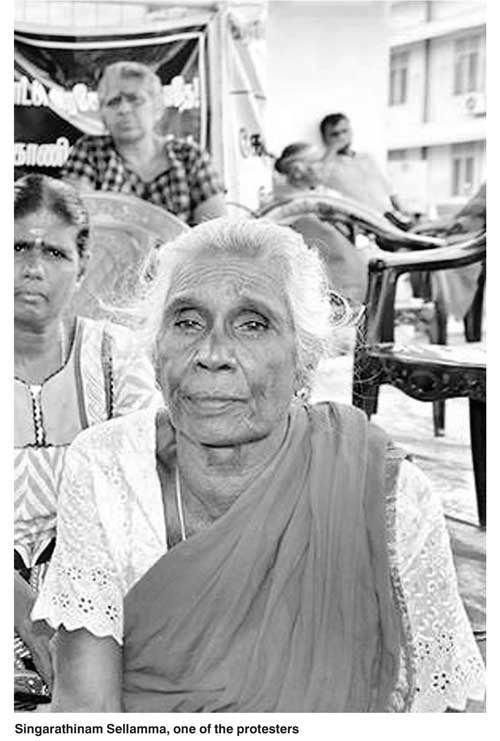Tuesday Feb 24, 2026
Tuesday Feb 24, 2026
Saturday, 4 March 2017 00:00 - - {{hitsCtrl.values.hits}}
By Meera Srinivasan
The Hindu (Mullaitivu): “When I lie down here at night, I imagine being under the roof of my home,” says Singarathinam Sellamma, 83, seated among a small group of people outside the divisional secretariat in Puthukkudiyiruppu here.
For about 25 days now, representatives of 49 families have been taking turns and fasting at the entrance of the government’s administrative unit in the small town, staying put under a roadside shelter. Their demand is simple – they want to return to their homes across the road, located on the 19 acres of land that the military has occupied since 2009. Hundreds of families like theirs were displaced in the final phase of the war.
“Why should I live at the mercy of a relative when I have my own home? We have our documents. Why is it so difficult for the government to verify all that and give back our land?” asks Sellamma, sulking at the number of photocopies she has had to make for different petitions. After losing a son and her son-in-law during the war, the only reason she keeps hopes afloat is to “go back home one day”.
While the Government has so far released about 9,020 acres that was under military occupation, war-affected people in different parts of the north and east have been protesting incessantly to reclaim the remaining civilian land that is occupied by the military.
On the other side of the road is a small shop, its doors locked up. “That’s where my daughter ran a small grocery store,” Sellamma points out. Adjacent to it is a gate where two Army personnel are seen standing, guarding the entry point.
For the displaced families, meeting bureaucratic requirements for title deeds or documentation they may have lost during war years is only part of the challenge. But protesters in Puthukkudiyiruppu and the nearby Keppapilavu, where 84 families were protesting, raise a more fundamental question — why does the Army still hold people’s land almost eight years after the war?
Broken promise
“Local Government officials told us they were releasing our lands, asked us all to assemble there and then went back on their word while the army stayed there. That is when we started protesting,” says Krishnakumar Krisanthi of Sooriyapuram village in Keppapilavu.
For nearly a month, families have stayed at the protest site, cooking community meals there, while their children study and play about behind the tents put up.
Following a recent meeting with President Maithripala Sirisena on the issue, Leader of Opposition and TNA veteran R. Sampanthan told reporters that the President had agreed to release the land belonging to the people of Mullaitivu by 4 March. “We heard the news, but we will not call off our protest till it actually happens,” says Lingeswaran Easan, Sellamma’s son.
Although scattered, a key reason for the protests to persist for a month, according to protesters, is the opening up of democratic space.
“We could not have done this two years ago,” said Silan, who was part of the Pudukkudiruppu protest, alluding to the high surveillance and intimidation during former President Mahinda Rajapaksa’s time. Not only have the struggles continued, but they have inspired solidarity from fellow villagers and outsiders alike.
Making a nuanced point about the terms of their protest, Silan says: “We’re not against the Sinhalese people or the Army as a whole. We want the Army to vacate our land. This message has to go to the south so that the people there appreciate our protest better.”
For many, land is not only “home”, but also “food”. In addition to agricultural land where they cultivated paddy or peanuts, families that once resided in these areas often supplemented their incomes selling coconuts, mangoes or betel leaves growing in their backyard.
“Note that all the recent protests have been about natural resources – access to land or the sea, in case of fishermen, says Mullaitivu fisher leader A. Mariyarasa. “That is because our livelihoods depend on them. Our lives are so intimately tied to the land and sea.”